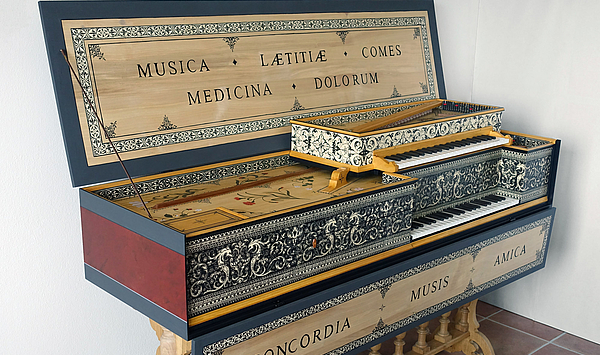
Virtuoso Weimar
Prof. Bernhard Klapprott plays music by Byrd, Bull and Sweelinck on a precious "muselaar" replica
The world has never heard this before: for the first time, an elaborately and lovingly reconstructed keyboard instrument from Shakespeare's time is being played in Weimar. There are no longer any original copies of the so-called "Muselaar" that can be played or restored. That is why Bernhard Klapprott, professor for historical keyboard instruments at the Department of Early Music at the University of Music FRANZ LISZT Weimar and multiple CD prize-winner, has had an instrument rebuilt by masters of their trade - and will present these unique sound worlds on Friday, 5 May at 7:30 pm in the Festsaal Fürstenhaus.
Tickets for the concert in the series "Virtuoses Weimar - Lehrende im Konzert" (Virtuosi Weimar - Teachers in Concert) at 12 euros, reduced rate 8 euros, are available at the Tourist Information Weimar and at the box office.
The concert programme is entitled "John come kiss me now" and features music from William Shakespeare's time. Works from the 16th and 17th centuries from England and the Netherlands by William Byrd, John Bull, Orlando Gibbons, Thomas Tomkins, Jan Pieterszoon Sweelinck as well as anonymous works from Scotland and Ireland will be performed.
Bernhard Klapprott will also play his own variations in the style of English virginalists on a theme by John Bull. His Muselaar is a copy by Cornelis and Hubregt Bom and Hans Nieuwenhuijzen from Schoonhoven in the Netherlands after an original by Joannes Ruckers (Antwerp) from 1623.
Famous painters such as Jan Vermeer depicted it, important composers such as Byrd, Bull and Sweelinck wrote numerous works for this instrument, which is extremely rare to hear today: the muselaar. It is a cuboid keyboard instrument with horizontal strings, whose keyboard is positioned on the right, unlike the virginal. As on the harpsichord or spinet, the strings are plucked by so-called keels. It is characterised by a particularly intense, warm, fundamental, somewhat bell-like sound.
The instrument presented in Weimar is a double muselaar, a so-called mother-child muselaar with a large mother instrument in "normal" pitch and a small child instrument that sounds an octave higher. The "child" lies in the "mother" instrument, i.e. in the "belly of the mother", and can be taken out so that both can be played individually. But they can also be coupled, i.e. sound together. What is inaudible today in the original was popular in Flanders as well as England between about 1550 and about 1650.
Bernhard Klapprott performs internationally as a harpsichordist, clavichord player, organist and conductor. Several of his CD recordings on historical keyboard instruments have been awarded the "Preis der Deutschen Schallplattenkritik" and the "ECHO Klassik". His teaching activities have also taken him to master classes and guest lectures in Europe and the USA.
On the 400th anniversary of the original Muselaar by Joannes Ruckers in the Landesmuseum Württemberg in Stuttgart, Bernhard Klapprott will play a concert there on his replica on Sunday, 14 May 2023. After the concert, there will be film recordings with the musician at the instrument.
[20 April 2023]
